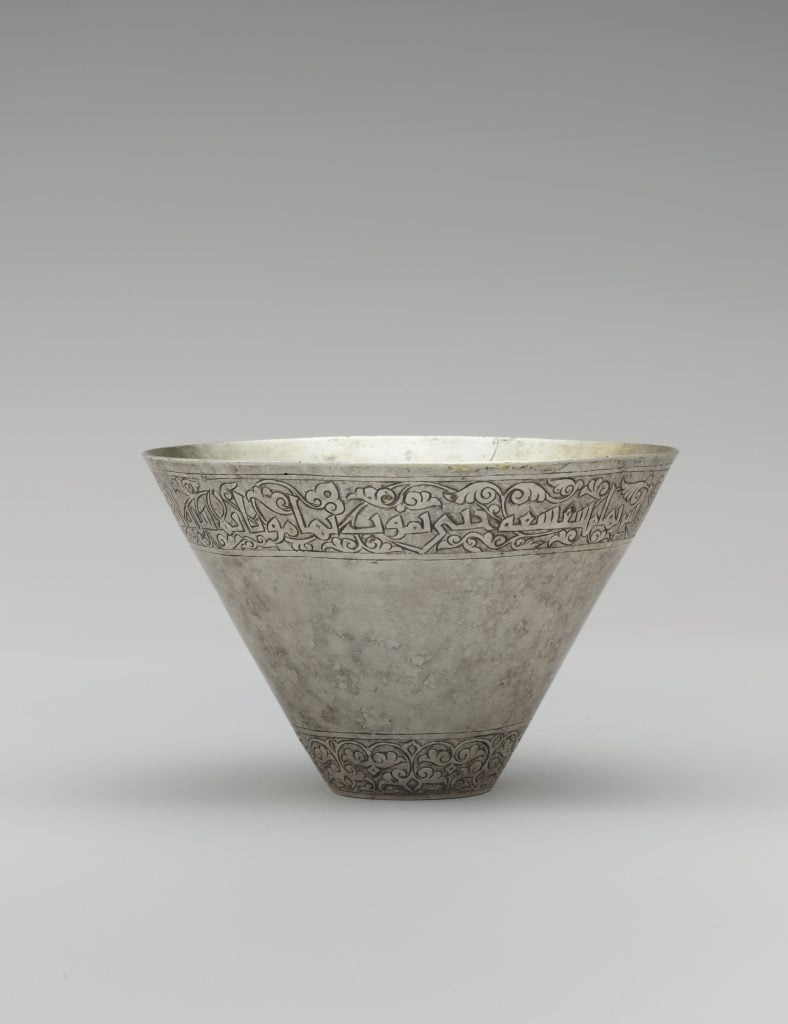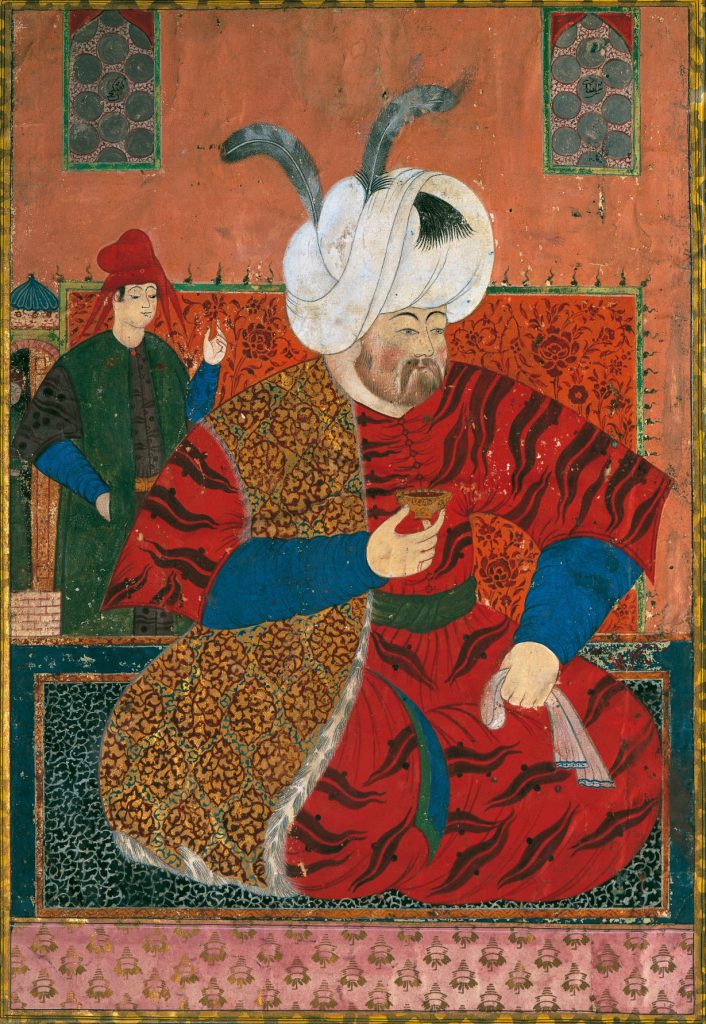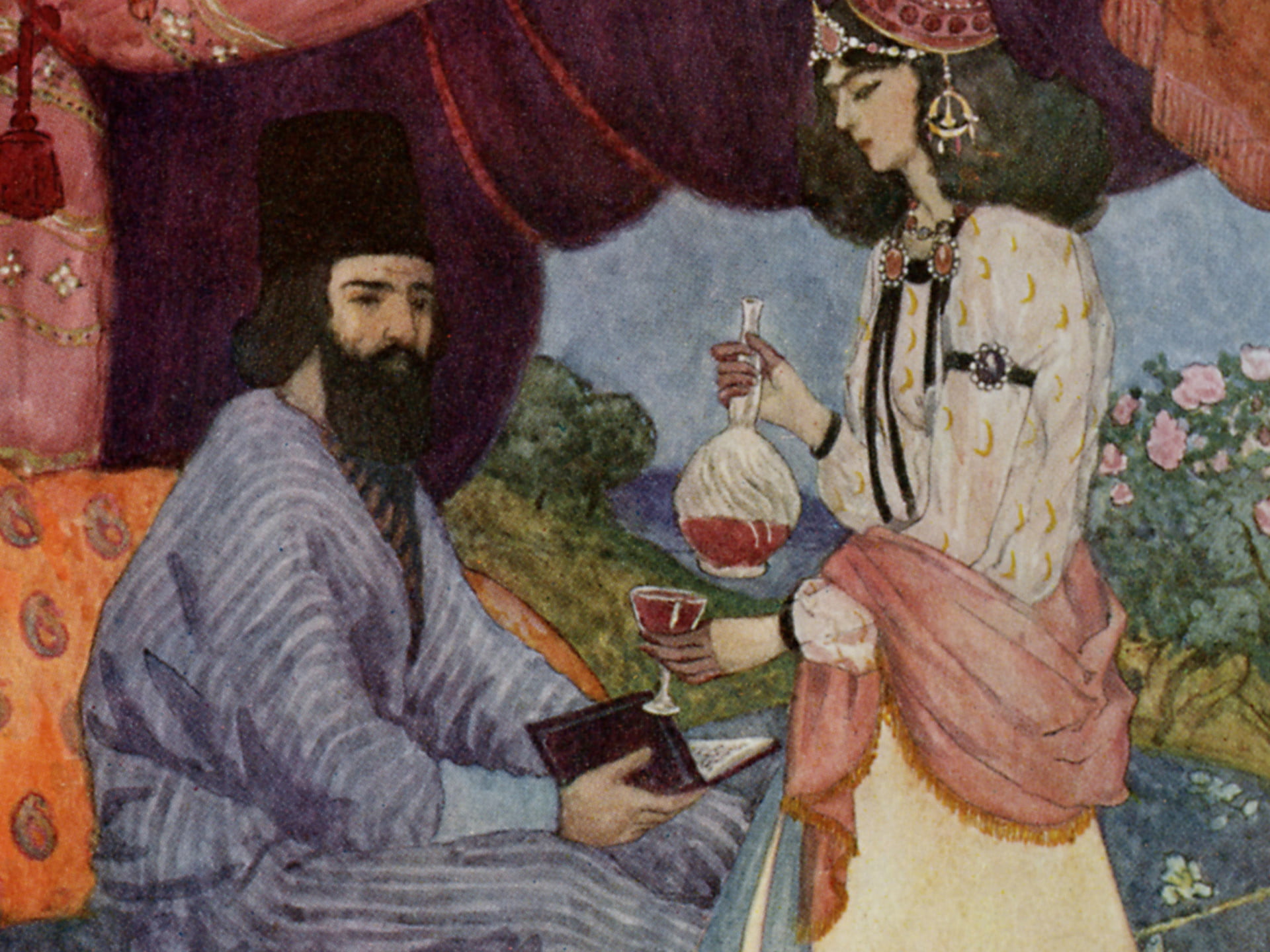It is widely believed that Islam prohibits alcohol. We checked whether such a norm is actually contained in Islamic religious texts.
On the Internet you can find materials approversthat the ban on alcohol in Islam is logical, and its occurrence is associated with drunkenness, common among Arabs. At the same time, we know the poems of representatives of medieval Muslim culture (for example, Omar Khayyam), glorifying wine, as well as images in which captured scenes of royal feasts with wine as a common attribute. In addition, the word we are familiar with "alcohol", as well as the term "alambik" (distillation vessel) are words of Arabic origin.
In the central part of the Arabian Peninsula - the region where Islam began - winemaking was poorly developed due to the climate unsuitable for growing grapes. At the same time, information about the production of wine not made from grapes in Arabia is already found in ancient authors. For example, Strabo mentions, that the Arabs mainly “extract wine from palm trees.” Viticulture in Arabia developed mainly in the south, in the mountainous regions of Yemen. This confirmed not only by archaeological finds, but also by information from South Arabian inscriptions. One of these inscriptions tells how at a feast people drink wine in the company of singers. In addition, the spread of the production of alcoholic beverages may be evidenced by lexical diversity - in Arabic there are from 100 to 250 words to represent them.
It cannot be said that this state of affairs changed radically with the emergence of Islam in Arabia. In hadiths - reports about the Prophet Muhammad - there is information that his companions drank wine. In Medina his uncle Hamza ibn Abd al-Mutallib, while intoxicated, killed the camels that belonged to the cousin and son-in-law of the prophet Ali. When Hamza was brought to Muhammad, the prophet began to reproach his uncle for what he had done, but not for drinking wine. Another interesting detail of this story is that Hamza, along with other Muslims, drank wine in the company of the singer. Exactly the same description of the feast was given in the South Arabian inscription mentioned above, which indicates the spread of this table practice throughout Arabia.
The absence of a prohibition on drinking wine is confirmed by early verses (verses) of the Qur'an. According to Muslim tradition, God sent down revelations throughout the life of Muhammad, and Quranic science divides suras of the Koran according to the time of their revelation into Meccan (those that were revealed to Muhammad during his life in Mecca) and Medina (received after the Hijra - the resettlement of the prophet and his companions to Medina). In particular, in the Meccan sura “an-Nakhl” (“The Bees”) mentioned wine from grapes and dates: “And from the fruits of palms and vines you take for yourself an intoxicating drink and a good inheritance. Verily, in this is a sign for people of understanding!” (hereinafter quotes from the Koran translated by I.Yu. Krachkovsky). This verse does not talk about the prohibition of “intoxicating drinks,” however, “people of understanding” must correctly understand this sign of God and independently distinguish between the harm and benefit of its use.

Second half of the 11th - 12th centuries.
Metropolitan Museum of Art (USA)
The attitude towards alcohol in the Koran gradually became stricter. In a later surah "al-Bakara" (“Cow”), which dates back to the Medina period in the life of the prophet, wine is on a par with the gambling game maysir (its participants bought a camel together, and then divided its meat according to lot). It is said about maysir and wine that “in both of them there is a great sin and some benefit for people, but their sin is greater than the benefit,” that is, drinking alcohol in this context is interpreted as an action, the harm from which exceeds the benefit from it. At the same time, a later verse from the sura "an-Nisa" (“Woman”) forbids believers to pray in this state: “Do not approach prayer when you are drunk until you understand what you are saying.”
Finally, even later verses in terms of the date of revelation are actually announce Both drinking alcohol and gambling are forbidden: “Wine, maysir, altars, arrows are an abomination from the work of Satan. Avoid this." In the next verse from the same sura “al-Maida” (“The Meal”) this thought repeats itself in relation to wine and maysir, with the help of which “Satan wants to instill enmity and hatred among you.” It is immediately worth noting that the “arrows” in the verse above refers to the widespread practice among Arabs of using arrows with inscriptions to determine behavior in a given situation. How explained in their commentaries on the Koran, the Arabs were guided by the inscriptions on the arrows, taking them as God's command. Returning to the main topic, these verses demonstrate that as the Muslim community grew, the Qur'an increasingly prohibited drinking alcohol and being intoxicated. If initially it was said that a reasonable person himself is able to determine the benefits and harms of wine, then in later verses the use of alcohol was classified as an increasingly serious violation.
Muslim religious scholars explained the nature of such gradual prohibitions using the concept naskha (cancellations). There are a number of verses in the Koran, the postulates of which contradict the postulates of earlier or later parts of the sacred text. The concept of naskh is that a later verse can cancel or clarify the provisions recorded in an earlier one. Thus, a hypothetical situation in which a Muslim can be guided by one of the early “wine” verses that does not contain a strict prohibition on drinking alcohol is excluded - the provisions of the early verses are clarified by later ones, which include a strict prohibition.
Moreover, in the Koran, wine is mentioned not only as a source of danger for the believer, but also as a reward for the righteous. Several passages of the Muslim holy book describe scenes awaiting pious Muslims in paradise, and among these descriptions wine is mentioned more than once. To the Righteous destined the afterlife in a garden where rivers of water, milk and wine “pleasant to drinkers” flow. The drink that will be served in heaven does not contain "riot" and also does not cause "idle talk and incitement to sin", "headache and weakness". In other words, heavenly wine, which is available only to the righteous, is radically different in properties from earthly wine.
The prohibition on drinking alcohol and being in a state of intoxication is clarified and supplemented in hadiths. In one of them reported, that everything that causes intoxication is recognized as wine (khamr) and is therefore forbidden for Muslims (haram). The term "khamr", which appears in a number of Qur'anic contexts, will be translated for simplicity as "wine", although it refers to a large number of intoxicating drinks obtained by fermentation. Also in hadiths classified products from which alcohol is made: grapes, dried dates, honey, wheat and barley. Text of one of the hadiths sends away to the wine of heaven: “He who drinks wine in this life will not drink it in the next life unless he repents.” The hadiths thus continue the line laid down in the latest verses of the Qur'an on this topic: they confirm the Qur'anic principles, while expanding the categories of intoxicating drinks.

Aga Khan Museum (Toronto)
In the first centuries of Muslim history, Islamic law actively developed (fiqh), within which there are various schools of law (madhhabs). Among law schools formed various interpretations of the term “khamr” and attitudes towards intoxication. Representatives of the Maliki and Shafi'i madhhabs insisted on a complete ban on intoxicating drinks, using different reasons. The Malikis based the ban on Quranic verses that stated that alcohol causes hatred and enmity among Muslims and prevents them from performing their religious duties. The Shafiites, while paying tribute to the Koran, also relied on the hadiths mentioned above about the strict prohibition of alcohol. Both of these schools of law criticized representatives of the Hanafi madhhab, who initially advocated a narrower interpretation of the term “Khamr”.
The Hanafis, unlike other schools of law, originally believed Hamrom only drinks made from fresh grape juice as a result of fermentation, and therefore allowed the production of drinks from, for example, boiled grape juice. In addition, Hanafi jurists at the early stage of the school’s existence did not prohibit not only the production, but also the consumption of such drinks, broadly interpreting the criteria for intoxication: difficulty in speaking or the inability to distinguish day from night, and a man from a woman. Over time, the Hanafis came to the conclusion that there was a need for a complete ban on the production of intoxicating drinks and the inadmissibility of their use.
As for the Hanbali madhhab, it, initially being the most conservative, here stood in solidarity with the Malikis and Shafiites: how notes One of the authors, all three of these madhhabs discuss drinking alcohol only in the context of punishment for it. Thus, a consensus regarding the inadmissibility of consuming any alcohol in any quantity has emerged among the major Sunni schools of law. Shia jurists are in solidarity with my colleagues on this issue.
The social side of this ban and the application of these restrictions in practice had many nuances. With the accession of the Abbasid dynasty to the caliphate in 750, court culture and etiquette began to take shape under the distinct influence of Iranian pre-Islamic traditions (including royal feasts with wine and musicians). These traditions spread into the Islamic era, despite the emergence of a legal prohibition. Winemaking developed in the Muslim world, and one of its centers was the city of Shiraz. Shiraz wine (the connection of which with the modern variety of Shiraz has not been proven) was very popular and even exported to Europe.
In addition, the legal norms of Islam (including the ban on alcohol) did not apply to non-believers. In this regard, in large Muslim cities, order and compliance with the rules of Sharia were monitored by specially appointed mukhtasib overseers, and the trade in wine was limited to neighborhoods in which non-Muslims lived. In Persian lyric poetry, such an abstract quarter is called “kharabat"and becomes one of the main scenes of action. For example, the lyrical hero of the poet Hafiz Shirazi, who is tired of the hypocrisy of those around him, goes to Kharabat (at the end of this articles there is a philological translation and commentary of one of Hafiz’s ghazals, in which all these motifs are found). He comes to a drinking establishment, where an old magician (that is, a Zoroastrian or, more broadly, a non-Muslim) gives him wine. However, such passages can be interpreted metaphorically: an eccentric mystic, in the process of knowing God, receives the wine of knowledge from his mentor.
Wine motifs appeared in the poetry of the Muslim world even before Hafez. A whole genre has formed in Arabic lyrics hamriyat — the poets who chose him sang the praises of wine and feasts. It is believed that the development of this genre is also associated with the influence of Iranian pre-Islamic poetry, which described royal feasts, and one of the main masters of hamriyat poems was the poet of Persian origin Abu Nuwas.
In a number of modern countries, the legislation of which is in one way or another based on Sharia norms, alcohol is prohibited, and its production, smuggling or consumption is criminally punishable. At the same time, for example, in Iran these measures do not apply to officially recognized communities of other faiths - Christians of the Armenian or Assyrian churches. The official ban on the sale of alcohol creates new opportunities for the drinks market: in Iran, for example, the non-alcoholic beer industry is very developed, and in some stores you can even find products from Russian manufacturers. In some North African countries, however, alcohol is sold and even produced, despite the introduction of Sharia principles into their legal system. In Egypt, for example, the ban on alcohol is a topic discussed on television and in the press, and some senior legal scholars recognized as true the old Hanafi version of the ban. In Egypt, too, the words of popular preachers about alcohol turn into viral news and even become the reason for the creation and parsing fakes.
Is it true
- A. Metz. Muslim Renaissance
- B. Shidfar. Abu Nuwas
- K. Osipova. Wine poems (hamriyyat) in Arabic classical poetry of the 6th–9th centuries: genesis and evolution
- M. Maraqten. Wine Drinking and Wine Prohibition in Arabia Before Islam
- M. Sheikh & T. Islam. Islam, Alcohol, and Identity: Towards a Critical Muslim Studies Approach
If you find a spelling or grammatical error, please let us know by highlighting the error text and clicking Ctrl+Enter.







